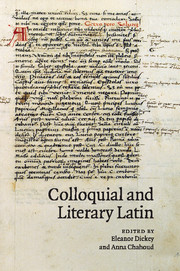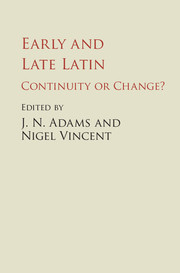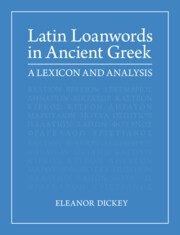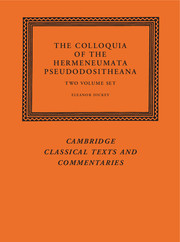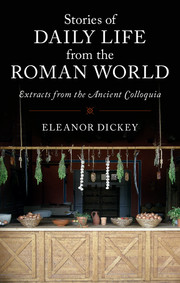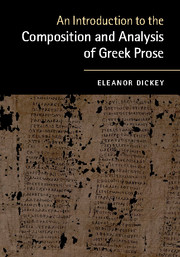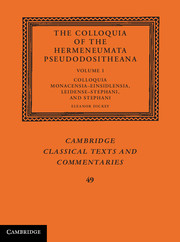Colloquial and Literary Latin
What is colloquial Latin? What can we learn about it from Roman literature, and how does an understanding of colloquial Latin enhance our appreciation of literature? This book sets out to answer such questions, beginning with examinations of how the term 'colloquial' has been used by linguists and by classicists (and how its Latin equivalents were used by the Romans) and continuing with exciting new research on colloquial language in a wide range of Latin authors. Each chapter is written by a leading expert in the relevant area, and the material presented includes new editions of several texts. The Introduction presents the first account in English of developments in the study of colloquial Latin over the last century, and throughout the book findings are presented in clear, lucid, and jargon-free language, making a major scholarly debate accessible to a broad range of students and non-specialists.
- Provides ground-breaking new work by leading scholars on this fascinating topic
- Offers insight into both Latin literature and Latin linguistics
- Uses clear, lucid, jargon-free language so that students and non-specialists can understand the complex and difficult questions and their solutions
Reviews & endorsements
"If, in a postmodern academy, the old 'Vulgar Latin' project of trying to recover the ways the Roman really spoke now seems hopelessly passé, this collection is unsurpassed for its studies of how they represented their speech. Something at least in this book will be required reading for everyone researching both Latin literature and Latin linguistics."
Philip Burton, The Classical Review
"… this volume is worthy of the great scholar and expert on 'colloquial' Latin to whom it has been dedicated."
Gerd Haverling, Journal of Roman Studies
"… represents a clearly delineated and sustained enquiry into the nature of colloquial Latin that makes a substantial contribution to scholarship, with a series of incisive studies of Latin style that partly break down previous easy assumptions and misleading claims about the distinctions between 'colloquial' and 'literary' as different registers of the Latin language. … [The reader] comes away with a much sharper understanding of stylistic variations in Latin literature, and the collection should be of as much interest to literary critics (we need to sit up and take notice!) as to philologists."
Rebecca Langlands, Greece and Rome
Product details
September 2016Paperback
9781107684416
534 pages
230 × 154 × 28 mm
0.77kg
Available
Table of Contents
- Preface David Langslow
- 1. Introduction Eleanor Dickey
- 2. Colloquial language in linguistic studies James Clackson
- 3. Roman authors on colloquial language Rolando Ferri and Philomen Probert
- 4. Idiom(s) and literariness in classical literary criticism Anna Chahoud
- 5. Preliminary conclusions Eleanor Dickey
- 6. Possessive pronouns in Plautus Wolfgang David Cirilo de Melo
- 7. Greeting and farewell expressions as evidence for colloquial language: between literary and epigraphical texts Paolo Poccetti
- 8. Colloquial and literary language in early Roman tragedy Hilla Halla-aho and Peter Kruschwitz
- 9. The fragments of Cato's Origines John Briscoe
- 10. Hyperbaton and register in Cicero J. G. F. Powell
- 11. Notes on the language of Marcus Caelius Rufus Harm Pinkster
- 12. Syntactic colloquialism in Lucretius Tobias Reinhardt
- 13. Campaigning for utilitas: style, grammar and philosophy in C. Iulius Caesar Andreas Willi
- 14. The style of the Bellum Hispaniense and the evolution of Roman historiography Jan Felix Gaertner
- 15. Grist to the mill: the literary uses of the quotidian in Horace, Satire 1.5 Richard F. Thomas
- 16. Sermones deorum: divine discourse in Virgil's Aeneid Stephen Harrison
- 17. Petronius' linguistic resources Martti Leiwo
- 18. Parenthetical remarks in the Silvae Kathleen Coleman
- 19. Colloquial Latin in Martial's Epigrams Nigel Kay
- 20. Current and ancient colloquial in Gellius Leofranc Holford-Strevens
- 21. Forerunners of Romance -mente adverbs in Latin prose and poetry Brigitte Bauer
- 22. Late sparsa collegimus: the influence of sources on the language of Jordanes Giovanbattista Galdi
- 23. The tale of Frodebert's Tail Danuta Shanzer
- 24. Colloquial Latin in the insular Latin scholastic colloquia? Michael Lapidge
- 25. Conversations in Bede's Historia Ecclesiastica Michael Winterbottom.

